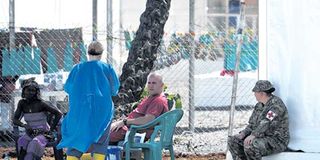World Health Organization says Ebola death toll now 7,890

Health workers and military personnel at the Kerry Town Ebola treatment centre on the outskirts of Freetown, Sierra Leone. The World Health Organization has said that the death toll from the Ebola outbreak in west Africa has risen to 7,890 out of 20,171 cases recorded. AFP PHOTO | FRANCISCO LEONG
What you need to know:
- Since the previous toll published on Monday, the first confirmed case of Ebola has been diagnosed in Britain.
- Almost all the deaths and cases have been recorded in the three west African countries worst hit by the outbreak.
- Sierra Leone, which has overtaken Liberia as the country with the most infections, counted 9,446 cases and 2,758 deaths on December 28.
- Cafferkey is the first person to test positive for Ebola in Britain and the second to be treated for the virus in the country after Pooley, who has since returned to Sierra Leone.
GENEVA, Thursday
The death toll from the Ebola outbreak in west Africa has risen to 7,890 out of 20,171 cases recorded, the World Health Organization said Wednesday.
Since the previous toll published on Monday, the first confirmed case of Ebola has been diagnosed in Britain.
Almost all the deaths and cases have been recorded in the three west African countries worst hit by the outbreak: Sierra Leone, Liberia and Guinea.
Those apart, six have died in Mali, one in the United States and eight in Nigeria, which was declared Ebola-free in October 2014.
Spain and Senegal, which have both been declared free of Ebola, had one case each, but no deaths.
Sierra Leone, which has overtaken Liberia as the country with the most infections, counted 9,446 cases and 2,758 deaths on December 28.
Liberia, long the hardest-hit country, has seen a clear decrease in transmission over the past month.
As of December 28, the country had recorded 8,018 cases and 3,423 deaths.
In Guinea, where the outbreak started a year ago, 2,707 Ebola cases and 1,708 deaths were recorded.
DEADLIEST VIRUS
Ebola, one of the deadliest viruses known to man, is spread only through direct contact with the bodily fluids of an infected person showing symptoms such as fever or vomiting.
Meanwhile, a British nurse who contracted Ebola in west Africa is being treated with the blood plasma of someone who survived the virus and an experimental anti-viral drug, the doctor supervising her care said Wednesday.
Pauline Cafferkey, who had been volunteering at a British-built treatment centre in Sierra Leone, is being treated at the Royal Free hospital in London, which has the only isolation ward in Britain equipped for Ebola sufferers.
Doctor Michael Jacobs said she was sitting up, reading and talking to medics from inside her isolation tent but warned that the Ebola virus was unpredictable and that her health could get worse.
“We’ve decided to treat her with two things, the first of which is convalescent plasma,” Jacobs told reporters.
“The second thing that we’ve given her is an experimental antiviral drug.”
The plasma was taken from the blood of a patient successfully treated in Europe and chosen from a shared European stockpile as the most appropriate for Cafferkey.
The antibodies it contains should help her fight the virus, Jacobs explained.
EXPERIMENTAL DRUG
The experimental drug is not ZMapp, the drug used to treat fellow British volunteer nurse William Pooley, who recovered from Ebola, because “there is none in the world at the moment”, Jacobs said.
“There is no specific treatment for Ebola that has been proven to work,” he emphasised.
Cafferkey is the first person to test positive for Ebola in Britain and the second to be treated for the virus in the country after Pooley, who has since returned to Sierra Leone.
Cafferkey expressed concern about her temperature to airport officials when she returned to London from Sierra Leone via Casablanca in Morocco on Sunday.
Her temperature was taken at London Heathrow Airport but did not raise alarms and she was cleared to take a connecting flight home to Glasgow.
She was eventually diagnosed with Ebola on Monday and flown from a Glasgow hospital to London on a military plane.People caring for the sick or handling the bodies of people infected with Ebola are especially exposed.
As of December 28, a total of 678 healthcare workers were known to have contracted the virus, and 382 of them had died, WHO said.





